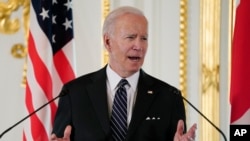U.S. President Joe Biden and the State Department said that nothing has changed in U.S. policy toward Taiwan after Biden's unusually hardline statement Monday of military support for the self-governed island prompted anger from China and gave a boost to the western Pacific island where many worry about an attack from Beijing.
"Our One China Policy and our commitment to peace and stability across the Taiwan Strait of course remains," said State Department spokesman Ned Price, who reiterated the U.S. commitment to provide the island with "military needs to defend itself."
"That is where we were then; that is where we are today," Price said
The State Department's clarification comes after Biden said "yes" when asked by a reporter in Tokyo whether he was willing to get involved militarily for Taiwan's defense, if needed. U.S. leaders normally leave that option open, as allowed by the 1979 Taiwan Relations Act, without making any firm commitment.
The White House walked back Biden's comments on Taiwan last year over a similar comment.
China claims sovereignty over Taiwan, although the two have been separately ruled since Chiang Kai-shek's Nationalists lost the Chinese civil war to Mao Zedong's Communists and retreated to the island. Beijing has not renounced the use of force if needed to bring Taiwan under its flag. The U.S. does not have official diplomatic ties with Taiwan but sells arms to Taiwan and maintains aircraft carriers in the Pacific.
Biden added at the news conference, which he attended with Japanese Prime Minister Fumio Kishida, that China lacks "the jurisdiction to go in and use force to take over Taiwan."
Taiwan response
Taiwan welcomed Biden's comments.
"This is a very important message, meaning that the United States will take very concrete steps to respond to any kind of military escalation in this area," said Andrew Yang, secretary-general of the Chinese Council of Advanced Policy Studies think tank in Taiwan.
Taiwan's Ministry of Foreign Affairs expressed "sincere welcome and thanks" in a statement Monday on Biden's remarks.
"Our government will not change its resolve to protect Taiwan's freedom, democracy and security and will continue stepping up self-defense," the statement says. "We will keep deepening our cooperation with the United States, Japan and other like-minded countries to safeguard security in the Taiwan Strait."
The U.S. leader's remarks will raise "confidence" in Taiwan, said Wang Wei-chieh, Taiwanese co-founder of the FBC2E International Affairs Facebook page. Given today's tensions between China and Taiwan, Wang said, many Taiwanese people will think Biden means the United States can now send troops.
China response
In China, Ministry of Foreign Affairs spokesman Wang Wenbin said his government was "resolutely opposed" to Biden's comments on Taiwan and that it would take self-protection measures. He called Taiwan a domestic matter with no place for "foreign intervention."
"We urge the U.S. side to avoid severe damage to peace in the Taiwan Strait and to Sino-U.S. relations," Wang told a scheduled news conference in Beijing. "The Chinese side will make resolute moves to protect its own sovereignty and security rights, and we do as we say."
Chinese officials are taking the Biden remarks "seriously," said Liu Yih-jiun, a professor of public affairs at Fo Guang University in Taiwan. He expects China to follow up with action, though without starting a military conflict.
Biden not alone
It is not the first time a U.S. president has been asked about Taiwan and spoken unambiguously, despite the U.S. policy of "strategic ambiguity" — meaning intentionally vague about Taiwan — with no formal diplomatic ties yet friendly with and selling weapons to the island.
Former President George W. Bush had raised questions in 2001 as Biden did this week. He was asked in an ABC interview if Washington had an obligation to defend the Taiwanese in case of an attack by China: "Yes, we do ... and the Chinese must understand that," he was quoted as saying.
"I believe that in reality it's still hard to predict whether the U.S. is going to send troops or no given the complexity of U.S. domestic politics and other calculations," Wang said.




